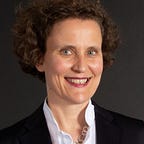Transform by Reading: (Agile) Coaching
The coaching stance is one facet of agile coaching which includes mentoring, training and consulting as well. The books recommended here by our coaches cover different aspects of coaching — from personal reflection to the coaching process.
Peter Aceto: Weology
Presented by Gina Röge
Storytelling from a progressive banker who provides insight into his ‘people first’ leadership model.
I liked the book a lot because it provides good impulses and prove points how change is realistically feasible by adapting perspectives.
Simon Sinek: Start with Why. How Great Leaders Inspire Everyone to Take Action
Presented by Margit Fischer
The book is written very clearly and contains countless examples, so that one can follow the author very well. As an agile coach, you often find yourself in the role of the motivator and want to convince your counterpart of the benefits of an agile way of working. This book has helped me to use the “why” to awaken precisely this motivation and, ideally, enthusiasm, and to give my teams a tangible, clear perspective.
Carol Dweck: Mindset
Presented by Elisabeth Liberda
During four years it was in my pile of unread books… Again and again I had read and heard about the concept of “fixed mindset” and “growth mindset” and did not think that the book would bring many insights beyond that. Until, eventually, I did read it with great profit.
The widely used quotes suggest an either-or. Either you have a “fixed” or a “growth” mindset. But this is over simplified.
People with a “growth mindset” assume that their intelligence can always evolve. Making an effort in learning opens up perspectives for them, and they tend to see new experiences, setbacks and feedback as an incentive for their further development.
People with a “fixed mindset,” on the other hand, assume that their intelligence is a given. To exaggerate, they tend to think of themselves as geniuses or untalented. They avoid or reject learning challenges because — depending on their point of view — this would question their “genius” or because the effort is not worth it, since they are already “hopeless”. In both cases, people do not utilize their potential.
We all want to have a “Growth Mindset” or, as agile coaches, are convinced to have one. Unfortunately, things are not that simple. A person’s mindset is never universally “fixed” or “growth”, but rather varies in different areas of life such as work, family, hobbies, sports, etc. The starting point is learning experiences in childhood, which were supported or slowed down by parents and teachers. Surprisingly, even well-intentioned feedback (Wow, you did a great job! You are really good!) tends to prevent further learning rather than encourage it. The good message is that over the course of life, everyone can develop one’s mindset toward “growth” through self-reflection and supportive feedback or questions. Carol Dweck describes this very vividly using the example of children in her TED Talk on the “Power of yet”, easy to transfer to adults.
What does this mean for transformation coaching? Learning at all levels is the prerequisite for a successful agile transformation. Carol Dweck’s “Mindset” offers many suggestions for all people whose companies have embarked on this journey and for their coaches, who can open up new perspectives by asking appropriate questions.
P.S.: Like many American books, this one contains many stories and anecdotes for illustration. The basic concept of “Growth and Fixed Mindset” is laid out in the general section at the beginning. Depending on personal interest, chapters on family, leadership, sports and school provide more information on the different mindsets and what supports a development towards a “Growth Mindset”.
Heinz Bude: Gesellschaft der Angst
Presented by Jan Kozik
Heinz Bude is a social scientist who breaks down the various sources of fear.
This book made it very clear to me that people often act out of various fears — this understanding still helps me today to be sensitive to these fears within a re-organization in a company. As an empathic coach, this understanding can help to respond to people appropriately during role changes and the like.
(This book is available in German.)
